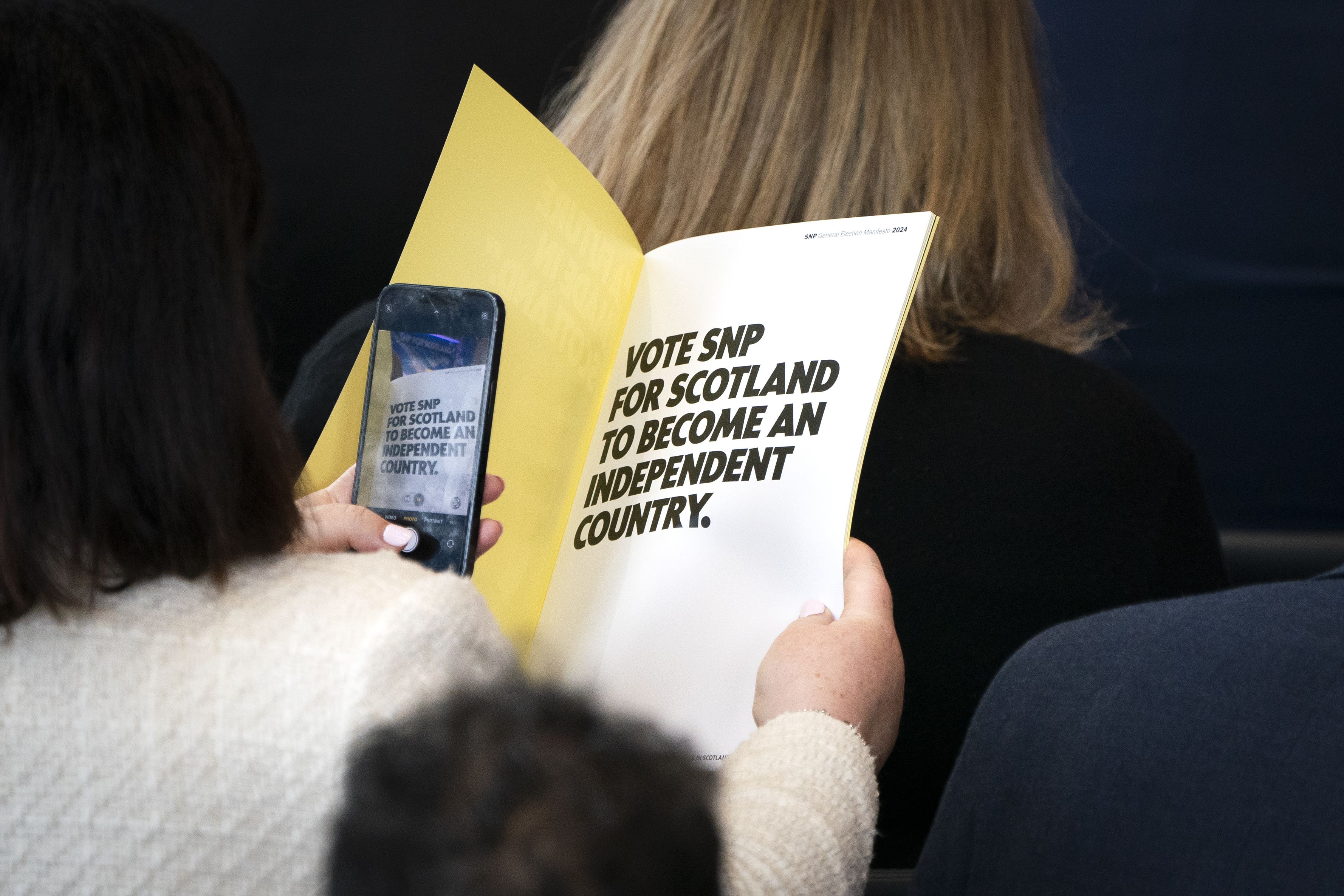What does the SNP manifesto promise and can those pledges be fulfilled?
First Minister John Swinney has outlined his party’s manifesto ahead of the General Election on July 4.

Your support helps us to tell the story
From reproductive rights to climate change to Big Tech, The Independent is on the ground when the story is developing. Whether it's investigating the financials of Elon Musk's pro-Trump PAC or producing our latest documentary, 'The A Word', which shines a light on the American women fighting for reproductive rights, we know how important it is to parse out the facts from the messaging.
At such a critical moment in US history, we need reporters on the ground. Your donation allows us to keep sending journalists to speak to both sides of the story.
The Independent is trusted by Americans across the entire political spectrum. And unlike many other quality news outlets, we choose not to lock Americans out of our reporting and analysis with paywalls. We believe quality journalism should be available to everyone, paid for by those who can afford it.
Your support makes all the difference.First Minister John Swinney has unveiled his party’s manifesto in Edinburgh, with the SNP looking to keep its stranglehold on Scottish politics.
Here, the PA news agency looks at some of the key questions around the party’s proposals.
– What is in the SNP manifesto?
Independence is front and centre in the 33-page document. Mr Swinney committed to putting it “page one, line one”, and it reiterates the party’s position of seeking to give “democratic effect” to a majority of seats for the SNP by seeking another referendum.
Elsewhere, the party vows to push for a change to the fiscal rules committed to by Labour, in favour of multi-year spending announcements, a “net worth rule” which seeks to take stock of the value of infrastructure investments rather than just the cost, and an upper limit on debt servicing costs.
The SNP will also table a Bill at Westminster that will end any risk of NHS privatisation, invest in infrastructure, scrap the Rwanda migrants scheme and the two-child benefit cap and demand an immediate ceasefire in Gaza.
– Will the party be able to do any of it?
The short answer is no. But the longer answer is maybe.
The SNP will never form the UK government because Scotland only has 57 seats and the party does not intend to run anywhere else.
But, if the party finds itself in a collegiate mood after the election, its MPs could work with the government of the day and see some of its manifesto pledges satisfied.
– How has the SNP campaign been going?
That depends on your perspective. If the comparison is between now and the heady days of the Nicola Sturgeon-led 2015 campaign, when the SNP won 56 of the 59 seats on offer, then it is going terribly.
But if the comparison is between how the party has fared in the past 12 months, then it is going fairly well.
Opinion polls have stabilised since Mr Swinney unexpectedly took over as party leader following the ill-fated tenure of Humza Yousaf, which was dogged by unpopular policy U-turns and a police investigation into the party’s finances which resulted in the house Ms Sturgeon shares with her husband and former SNP chief executive Peter Murrell being searched by detectives.
– Is SNP dominance in Scotland over?
It is too early to say. In the words of many politicians, the only poll that counts is on July 4, but those published before that consistently show Labour ahead of the SNP – although estimates of how this could translate into the number of seats vary.
– If the SNP loses its majority, what does that mean for independence?
It certainly does not help the cause. SNP policy is to seek to give “democratic effect” to the will of the Scottish people if the party wins a majority of seats on July 4 – which means to seek a referendum from a most likely uninterested government in London.
But that becomes difficult if the SNP does not actually win a majority.
The question of Scottish independence will not simply disappear, not while the SNP remains the largest party at Holyrood and one of the largest at Westminster in Scotland, but the party may seek to draw back from being as aggressive in its push.
– What would that mean for the 2026 Holyrood election?
It certainly makes it more interesting. Labour winning the most seats – or even a majority – in Scotland will buoy the party north of the border and likely have a deflating effect on the SNP.
But over the next 18 months, it would be for Scottish Labour leader Anas Sarwar – and potentially Sir Keir Starmer in Downing Street – to seize the initiative.
If Sir Keir is prime minister, a Scottish Labour-led Scottish government working in consort with a Labour-led UK government could be tempting for a Scottish public used to publicly fraught relations between Edinburgh and London for nearly two decades.
But if the next UK government fails to improve the lot of Scotland, the SNP will seize on such failings as a reason why Scotland should be independent.